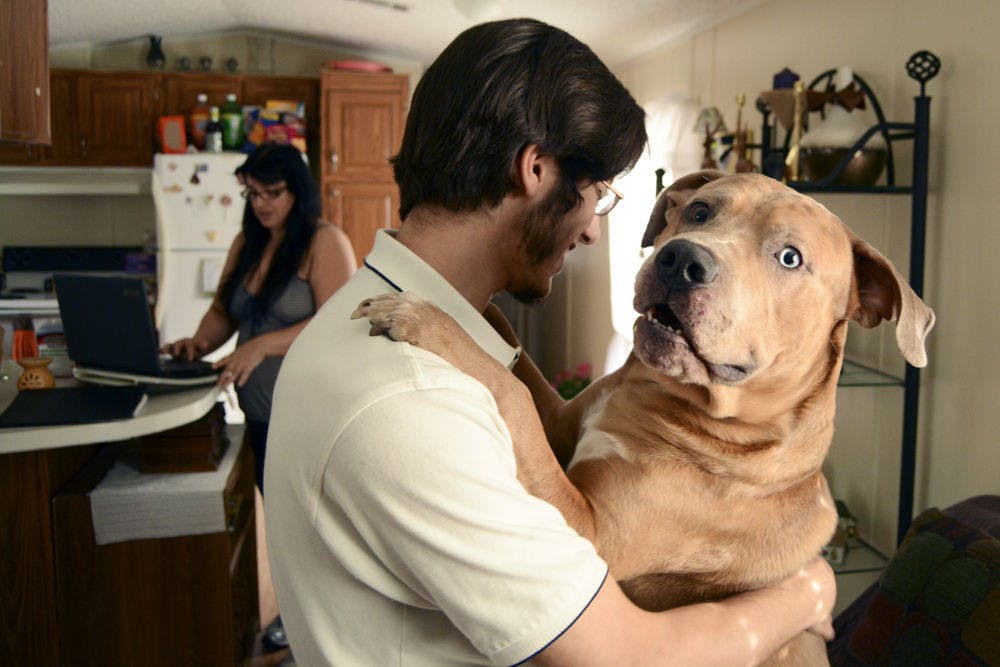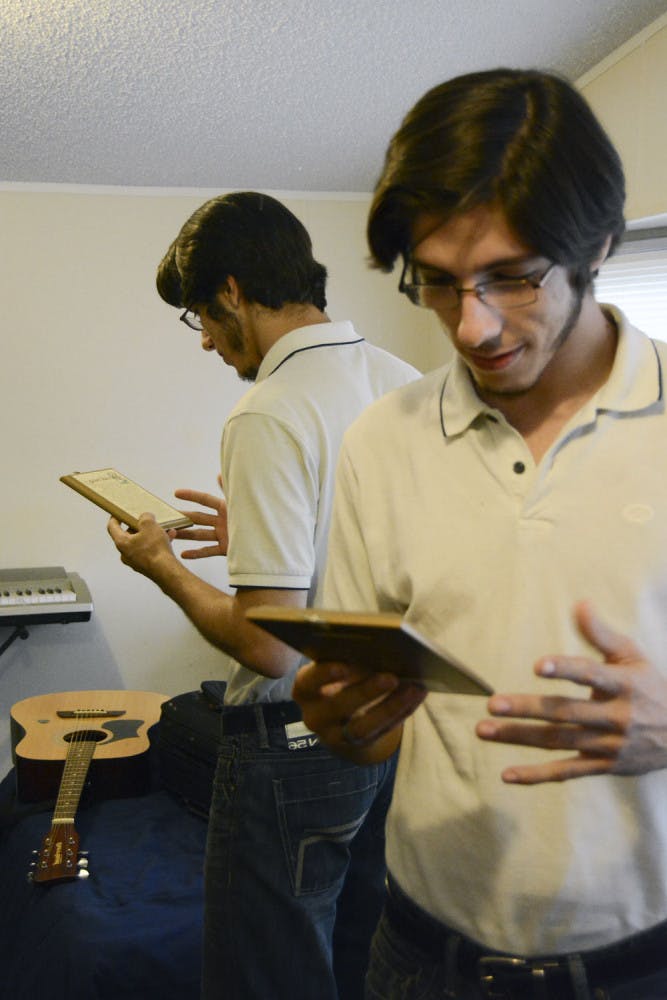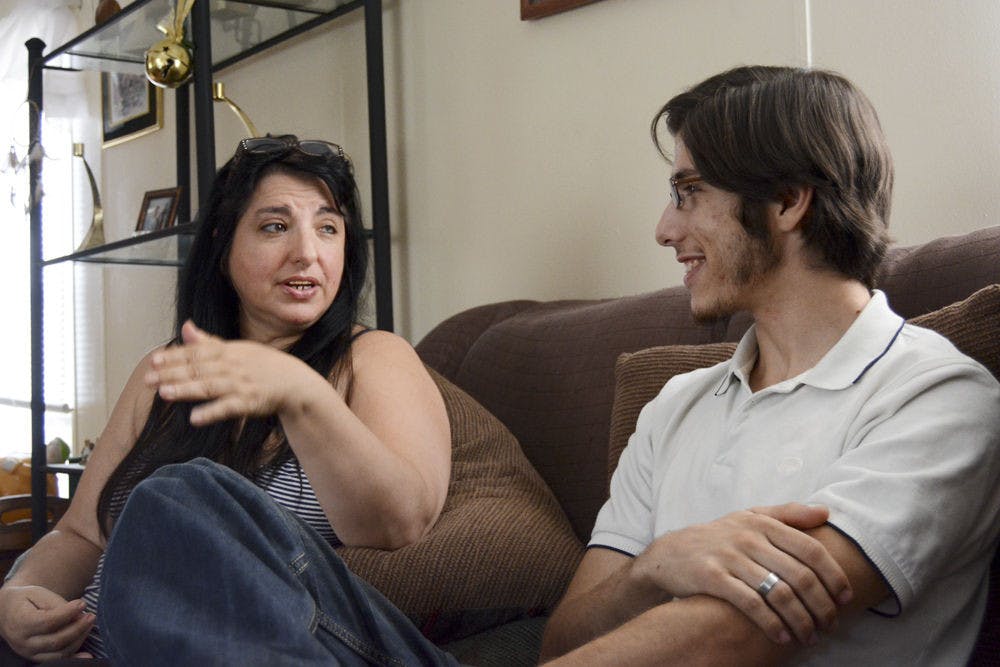Matias Garces’ fingers dance across the fretboard as his guitar cries out, singing the song of a man who lost it all.
The 19-year-old works 40 hours a week, grinding away to make enough money to pay his bills and save for college.
But his life as an undocumented immigrant has held him back.
He lives with his mother and his dog, Tank, an Australian shepherd pit bull, in a two-bedroom mobile home situated snugly in a mobile park. His blue, self-customized van sits outside on the green grass.
In his room are his prized possessions: several acoustic guitars.
It’s too easy to make electric guitars sound good, he said. Acoustic requires real talent, a talent Matias has built upon over the past several years.
Music is his outlet, an escape from the hardships and difficulties of life. A way to express the soul in a way words cannot. He plays a song of sadness and agony — a product of a life of hardship and disappointment.
He just wants to go to college, to reach the next stage in his life.
But money is holding him back.
Matias isn’t alone in his financial struggles, said Olivia Garcia, the director of the UF Institute of Hispanic Latino Cultures.
For many immigrants — documented and undocumented — trying to attend college, Garcia said the question isn’t “Will I or will I not get in?”
“It’s, ‘How am I going to pay for this?’” she said.
“The thing is, all immigrants pretty much have a very high financial burden on them as it is,” said Colin Abbott, a managing attorney of Florida Rural Legal Services, which helps migrant farm workers. “But then when you add to that the fact that their benefits are limited and their abilities to get assistance from the government is limited, if at all,” attending college becomes almost impossible.

Matias Garces embraces Tank, his Australian Shepherd-pitbull mix, inside his mobile home. Garces calls Tank his son.
Further complicating the issue for immigrants, especially those who are undocumented, are tuition fees. Depending on an immigrant’s legal status and residency, he or she may have to pay out-of-state tuition, which at UF, for example, is triple that of in-state.
Federal financial aid is an option for some immigrants, but not all. Immigrants can apply for private financial aid, but there’s no guarantee they’ll receive assistance.
Earlier this year, President Barack Obama announced a plan to make the first two years of community college free. Millions of people, such as Matias, would benefit, the White House said.
While the plan still has to be approved by Congress, Abbott said many immigrants could benefit.
The requirements to be eligible are simple. Students must maintain a 2.5 GPA, make strides toward completing their degree and attend school at least part-time.
All students have to do, Obama said, is work for it.
And that’s exactly what Matias has been doing.
• • •
In 2000, life in Uruguay for Hugo and Patricia Garces was difficult. The country was in crisis, Patricia said, and they wanted to get out. Most importantly, they wanted to give their children, Matias and Sabina, better opportunities than they had in Uruguay.
An uncle in Miami offered them to move in with him. The Garces family accepted the offer and came to Florida with tourist visas, which allowed them to legally stay in the U.S. for three months.
A local church worked to get them citizenships but was never able to.
On September 11, 2001, millions of lives were radically changed and the hope of obtaining citizenship was destroyed. The Garces family was living in a new America and was about to undergo extreme difficulties.
With expired visas, the threat of deportation became the Garces family’s biggest concern. They had to avoid police at all cost and live as discretely as possible.
Three years after moving to Miami, a family friend offered Hugo a job in Gainesville. He accepted the offer and moved his family into an old, moldy mobile home where cockroaches roamed free and air conditioning was a luxury. It was all they could afford while living paycheck to paycheck.
Life was just as difficult for the Garces family in Gainesville as it was in Miami. They had very little support and no one to turn to for help. They were undocumented and not eligible for federal assistance. And Matias and Sabina didn’t have the same opportunities as other kids, despite those opportunities being the very reason they came to the U.S.
“We always gave them what we could,” Patricia said.
Growing up, Matias was a happy kid who easily made friends, Patricia said. “Everything was good up until he became aware of the whole undocumented status.”
When Matias was about 16, Patricia and Hugo began getting into heated arguments over a friend Patricia was messaging online. Hugo would threaten her, she said, even saying he would kill her. Other times, he would slam his fist into the wall, just inches away from her head.
“Sometimes that’s more hurtful than actually being hit,” Patricia said.
During their final days of being together for 25 years, Hugo became more violent, Patricia said, to the point that living with him became intolerable. And one day, he choked her until she fell unconscious. Then he kicked her out of their home and told her friends and family that she had cheated on him with the friend she had been messaging online.
Patricia was forced to find a new place to stay in a town she hardly knew while Matias continued living with Hugo. Unknown to Matias at the time, Patricia began pressing charges against Hugo.
During their time together, Hugo grew closer to Matias, becoming more of a friend than a father.
“He was trying to manipulate me, too,” Matias said. “We went out to eat every day, we were buying and selling cars, and he would let me drive the fast ones, just stuff like that.
“He became like my best friend when before he really didn’t care,” he continued, his voice fading after each word.
One morning as Matias was preparing to leave for school, police in body armor stormed their home and arrested Hugo. Matias was left at home, found later that day by Patricia in his room crying. His father was gone. The man who was supposed to be there for him when he needed help, to guide him when life was tough and fix cars with him on the side had been snatched from his life.
Originally, Matias tried contacting Hugo. He had believed his father when he said Patricia had cheated. But when Matias saw the marks on his mother and heard the truth from her lawyers, he stopped.
“My dad really hurt our family and he doesn’t want to admit to it,” Matias said. “He doesn’t give a shit.”
On March 17, Hugo messaged Matias on WhatsApp.
“Hi Matias,” he wrote in Spanish. “I’m very sorry that you wouldn’t want to write me for my birthday, but don’t worry, what matters is that you’re OK with that and the rest of your life decisions. Dad loves you.”
Matias never responded.
• • •
After Hugo’s arrest, Matias and Patricia had to learn how to survive on their own. Because they were victims of crime, they were eligible for U-visas, which allowed them to obtain a social security number and an employment authorization document.
Patricia received her documentation first, but it would be several months before Matias received his. In the meantime, they needed money, so Matias took a job under the table at a factory while he was still in high school.
He worked up to 50 hours a week for minimum wage at the factory, often skipping school to pick up extra shifts. He’d work late, usually until 9 or 10 p.m. but sometimes later. He worked so late one night that he slept at the factory instead of returning home.
Any and all free time was devoted to school, but it wasn’t enough. His grades dropped and he fell behind in his school work. His social life was nonexistent, and he slowly lost touch with his friends.
“It made me feel like I have no life,” Matias said. “(Like) my life is literally just school and work.”
When he actually was at school, he sold candy. He gained a reputation for it. It made extra cash, and that was all that mattered. Most of his earnings went toward bills, so he needed all the money he could get.
He wanted to go to Santa Fe with his friends, but he knew he couldn’t afford to. His older sister Sabina had only been able to because she married a U.S. citizen, thereby gaining citizenship and becoming eligible for federal financial aid.
By late last year, Matias had saved about $2,000. But then his job laid him off, and he was forced to spend his savings as he looked for a new job.
At the beginning of this year, he got a new job at Chuy’s. He immediately started saving again and had saved almost $1,000 until taxes and an unexpected car problem took it all away in April.
Now, he’s saving again, but he’s uncertain if he’ll ever be able to attend college. Patricia now has her own job, but Matias is still the primary income provider. His bills take more than half his monthly income away, and one unexpected fee after another continues to arise.
If Obama’s plan is passed, Matias could enroll at Santa Fe and finally begin working toward a degree in business administration and obtaining a welding certificate.
“We don’t expect anybody to be bound by the circumstances of their birth,” Obama said during a speech earlier this year in which he announced his plan, titled “America’s College Promise”.
“If they were, I wouldn’t be here,” he continued. “But we expect everybody to get a fair shot.”
Matias wants to one day become a car salesman and eventually work his way up to owning his own dealership.
“I have the whole car salesman feel, look and speak,” he said, laughing.
He’s not kidding. Point to a random car on the street and he can tell you the brand, the model, its parts, its history and any controversy around it. When a woman drives up in a white sports car, Matias approaches her and asks her about her ride.
At Chuy’s, his favorite room to serve and bus in is the Hubcap room because of the hubcaps on the ceiling.

Garces reads “Desiderata,” a poem by Max Ehrmann, off a plaque he hangs above his bed in his room. “You are a child of the universe no less than the trees and the stars; you have a right to be here,” he reads.
But it’s unclear when, and if, he’ll reach those goals.
First, he wants to get a business administration degree and welding certificate from Santa Fe College.
But with each passing day, college seems more like a distant dream, something that he comes close to grasping but never fully reaches, held back because of a fate he had no control over.
Yet despite the hardships and uncertainties, Matias remains hopeful.
“I’ve never thought I don’t need to go to college,” Matias said. “I know I want a college education. ... It’s just a matter of fact when I can have it, when I can reach it.”
Until then, Matias will keep working and saving. Then maybe one day, he’ll finally be able to attend Santa Fe.
Maybe one day, instead of playing a song of despair, his soul will sing of a man who pulled himself up, rose above his challenges and overcame all odds.
Patricia Garces speaks to her son, Matias Garces, in Spanish in the living room of their mobile home. The Garceses came to the U.S. in 2000 on tourist visas; when their visas expired they became one of the millions of undocumented families living in the country.






